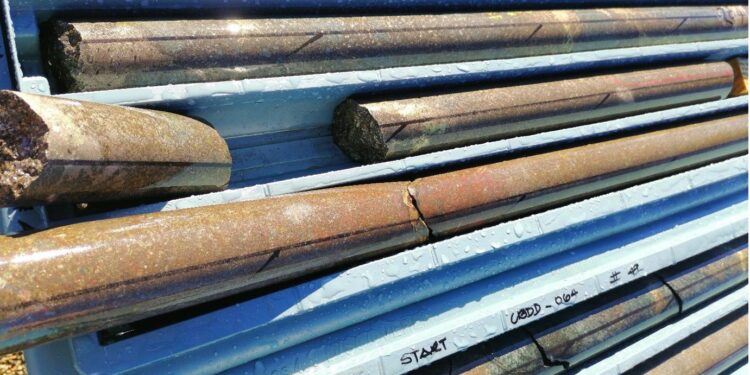Estrella Resources Limited (ASX: ESR) has received “spectacular” massive sulphide assay results from hole CBDD064 at the Carr Boyd Nickel and Copper Project in Western Australia.
CBDD064 is a diamond drillhole targeted below the existing workings at the company’s 100% owned flagship Carr Boyd Nickel and Copper Project, located approximately 80km NNE of the City of Kalgoorlie-Boulder.
“The Carr Boyd project continues to produce some exceptional results, with numerous intersections of massive nickel sulphide and some very high nickel and copper assays associated with these drill hits,” Managing Director Chris Daws said.
“Our understanding of this large mineralised system is gaining with every drill hole. The high-grade results received from hole CBDD064 beneath the historic Carr Boyd mine not only sees our geological model intact but also bolsters our confidence to unlock further massive nickel sulphides.
“With nickel prices now reacting to strong demand from the global EV and battery revolution, Estrella is in an enviable position owning numerous quality nickel sulphide projects with scope for significant discoveries.
“The Ukraine War with Russia has seen nickel prices reach extraordinary levels overnight on the London Metal Exchange in excess of US$21.80/lb. These are prices that haven’t been seen since the resource boom in 2007 and in Australian dollar terms we haven’t seen such prices ever. As much as the nickel price rise is welcomed the war in Ukraine is not and I very much pray that peace is restored to the people of Ukraine.
“We are also well funded to continue our drilling efforts to locate what we believe could be a world class nickel sulphide discovery at Carr Boyd and I look forward in providing further news as we push forward.”
Results from hole CBDD064 include:
Main Zone
- 16.2m(1) @ 3.12% Ni and 0.60% Cu from 192.35m, Including 8.07m(1) @ 4.31% Ni and 0.75% Cu from 199.85m
- Individual assays up to 6.42% Ni
Mid Zone
- 1.45m(1) @ 1.57% Ni and 0.75% Cu from 242.8m
Lower Zone
- 12.97m(1) @ 1.07% Ni and 0.25% Cu from 256.0m, Including 3.98m(1) @ 1.25% Ni and 0.41% Cu from 256.77m, And 5.00m(1) @ 1.37% Ni and 0.21% Cu from 263.97m
Mr Daws said the assays confirm high-grade mineralisation continues below the old workings. The intersections coincide with a Downhole Electromagnetic (DHEM) response modelled from CBDD056A which was drilled by Estrella into the basal contact in October 2021.
The Carr Boyd Mine was worked between 1972 and 1977 by Great Boulder Mines and then Western Mining Corporation (WMC) before being closed due to lowering nickel prices and WMC’s commitments elsewhere.
In total 210,000 tonnes at 1.44% Ni and 0.46% Cu were extracted via a 214m deep, three-compartment shaft. However, despite this extensive history, the source of this high-grade mineralisation has never been fully explained.
The mineralisation has historically proven to be relatively simple to mine, with a 10% nickel concentrate produced that was high in iron and sulphur whilst being very low in deleterious elements. Recovery was good at 79% given the ore was treated at the converted Fimiston Gold Plant when flotation of nickel sulphides was still at an early stage of development.
Modern flotation technology we believe will dramatically increase recoveries. The remaining JORC2004 resource stands at 636,000t at 1.4% Ni and 0.5% Cu (8,800 NiT and 3,100 CuT).
This resource was calculated in 2007 by Resource Evaluations Pty Ltd based upon historical mine mapping and additional drilling.
Further confirmatory drilling will need to be conducted by Estrella to produce a re-interpretation and JORC2012 compliant resource.
Exploration Update
The company has recently collared CBDD067 which is targeting the T5 basal contact south and at depth below the T5 Discovery. The rationale behind this drilling is to get better downhole electromagnetic (DHEM) coverage south and below the currently identified mineralisation.
The DHEM response from the known T5 mineralisation is very strong and tends to mask additional sulphides away from the main conductors, such as that seen in CBDD042A, where massive breccia sulphides were intersected yet there was no DHEM response.
Additionally, the structural information gained from drilling this hole will enable a better understanding of the possible late off-set controls on the T5 Mineralisation.
This hole will be completed in the next few weeks, around the same time as Topdrive Drillers Australia (the drilling contractor at Carr Boyd) takes receipt of a brand new UDR drill rig which will be commissioned at Carr Boyd towards the end of March.
The vompany retired the use of an RC rig as it was not achieving the targeted drill metres. The availability of two diamond rigs will enable Estrella to quickly advance its Phase 5 exploration programme, which will use a combination of diamond drilling and DHEM to blanket the highly prospective T5-Broonhill, Mossgiel and Gossan Hill Prospects, where the company has already identified mineralised pyroxenites along the basal contact.












